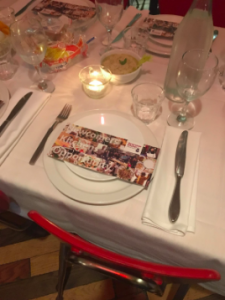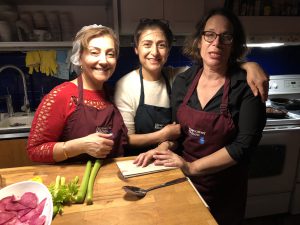Irma Qavolli
Winnipeg, Canada
My day began with an interview at Hospitality House, a place that houses and helps newcomers to Canada. In order to accommodate her discomfort with large crowds, I meet Sharon—an LGBT+ asylum claimant from Kenya—in the home she shared with other asylum claimants and refugees going through the asylum hearing processes. She asked that I omit her last name due to fear of persecution. Homosexuality is illegal in Kenya. She remained cautious during our interview, preferring that I not record our conversation and omitting details regarding her own migration journey. Her apprehensiveness is understandable, yet her demeanor was kind and receptive during our interview. She happily detailed her experiences volunteering with Welcome Place, Manitoba’s largest refugee settlement agency.
“I help write out their claims and help interpret because language is a big barrier. I don’t really go to so many places- I spend most of my time there.” She told me.
As the interview progressed, she disclosed a few details of her own migration process.
“I’ve been in Canada for 2 months now; I’m still waiting for my work permit and my hearing.” She detailed.
She also added that she began attending Friday meetings at the Rainbow Resource Centre—Manitoba’s only LGBT+ resource center. The new social support group, called New Pride of Winnipeg, meets to make connections, practice English, and share different cultural meals. Sharon is fluent in English, but she attends for the community and connections.
“You get to meet different people. It’s not very official but it’s a community.” Sharon said.
This unofficial sense of community makes a difference, especially for those whose gender identity and sexual orientation make them feel at odds with their own ethnic and cultural communities. In Sharon’s case, the illegality of homosexuality in Kenya, paired with strong religious beliefs, makes it “really difficult to connect” with other refugees from a similar cultural background.
For Sharon, spaces like the New Pride Friday social meetings provide a place “to unwind and meet friends.” She looks forward to attending every week.
This sense of informal community can also be found in Toronto, within the Newcomer Kitchen. The innovative non-profit allows Syrian refugee women to prepare and sell meals—an act of reclaiming agency for these Syrian women. They had been housed in hotels without kitchens when they first arrived. The Depanneur— self-described as a “fun, informal venue that celebrates the incredible diversity of Toronto’s culinary talent”— is home to the Newcomer Kitchen.
While enjoying their delicious cooking, I shared a dish with Len Senater, the founder of the Depanneur. He was proud of the accomplishments and attention that the program has garnered — including a visit by the Canadian Prime Minister Justin Trudeau — since its debut in April 2016.
While he spoke about the looming difficulties of keeping the location due to rising rents and overall gentrification of Toronto, he remained excited about how the model of Newcomer Kitchen has been able to positively impact the greater newcomer community and expand to other communities in cities across Canada.

A table in Depanneur, decorated with a flyer for Newcomer Kitchen

Syrian Chefs at Newcomer Kitchen